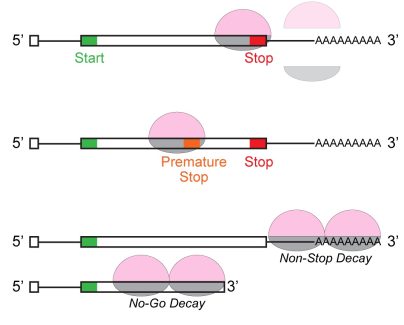
Significant differences are observed when normal or aberrant mRNAs are translated by ribosomes. Normal mRNAs are typically released and can be translated again, while problematic mRNAs are recognized and targeted for decay. However, the molecular events that underlie these decisions are not well understood. Since issues with translation can cause many diseases, better understanding of these mechanisms could help develop treatments for conditions such as cystic fibrosis, muscular dystrophy, and cancer.
The Lawson lab aims to understand how ribosomes, mRNA sequence and structure, and specialized decay factors work together to differentiate normal from problematic mRNAs. These interactions are challenging to study using conventional methods due to their dynamic and transient nature. Therefore, we employ biochemical, biophysical, and structural methods, as well as in vitro-reconstituted translation systems, to investigate how decay factors differentiate normal from problematic mRNAs during translation. Ultimately, this understanding may lead to new treatments for the ~11% of heritable human diseases caused by premature stop codons.
